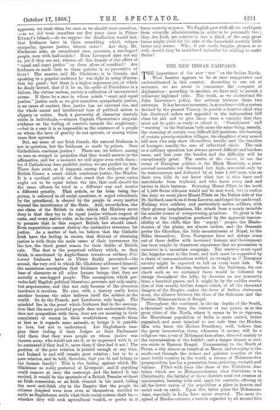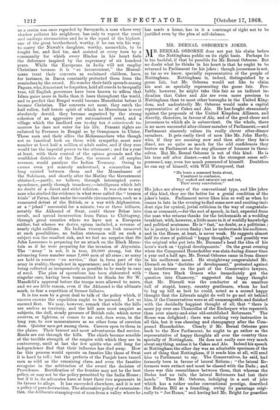THE NEW INDIAN CAMPAIGN. T HE importance of the new war
on the Indian North- West frontier appears to be at once exaggerated and underestimated in this country. According to one set of accounts, we are about to commence the conquest of Afghanistan ; according to another, we have only to punish a refractory highland tribe. The truth, as we understand Sir John Lawrence's policy, lies midway between these two extremes. It has become necessary, in accordance with a system devised by the present Viceroy, to punish a frontier chief who has disobeyed orders and appealed to the independent hill clans for aid, and to give those clans a warning that they must not be quite so ready to afford it. " Punishment " and "warning "in the Suleiman both mean the same thing, namely, the storming of certain very difficult hill positions, the burning of certain poverty-stricken villages, the slaughter of any armed hill men who may show themselves hostile, and the exaction of hostages, usually the sons of influential chiefs. The task as a military operation has always proved difficult and burden- some, and this. year the burden and the difficulty will be exceptionally great. The centre of the e'meute, to use the terms of European politics, is the Black Mountain, a pine- covered mountain ten thousand feet high, accessible only by its watercourses, and defended by at least 1,500 men, who on their own hills do not know what fear is, who have used matchlocks from boyhood, and who know every rock and ravine in their fastness. Storming Mount Pilate in the teeth of 1,500 Swiss riflemen would not be nice work, but to realize the duty we must place Mount Pilate on the Italian side of the St. Gothard, march on it from Lucerne, andforget the made road. Nothing tries soldiers, and particularly native soldiers, with their gloomy imaginations, like attack from a nearly invisible foe amidst scenes of overpowering grandeur. So great is the effect on the imagination produced by the apparent inacces- sibility of the cliffs, that the " sepoys " proper, the Hindo- stanees of the plains, are almost useless, and the Generals prefer the Ghoorkas, the little mountaineers of Nepal, to the Sikhs themselves. Even Europeans have not always come out of these defiles with increased honour, and Government has been taught by disastrous experience that no precaution is excessive in a mountain campaign. The reserves must equal the brigades sent to the front, and both must be supported by a chain of communications welded as strongly as if European cavalry might be expected to fall on every weak link. We cannot afford a Bhootan business in the Suleiman, for one check such as we sustained there would be followed by risings throughout the hills, by descents on our peasantry from a hundred passes, and it might be by the sudden revela- tion of that usually hidden danger which, of all the thousand dangers of the Empire, makes the faces of Indian statesmen stern, the alliance between the clans of the Suleiman and the Puritan Mohammedans of Bengal.
Throughout the continent, in the far depths of the South, a thousand miles from the centres of our power, as in the great cities of the North, where it seems to be so vigorous, the Mussulman population of India is more united, better organized, and, more inimical to our rule than the Hindoo. Men who know the Madras Presidency well, believe that the great insurrection there, whenever it occurs, will be a religious war, a war of Mohammedans alone, directed mainly to the extermination of the Infidel ; and a danger almost as seri- ous exists in Eastern Bengal. Commencing to the North at Patna, a city almost as fanatical as Mecca, and sweeping to the south-east through the richest and quietest counties of the most fertile country in the world, a stream of Mohammedan propagandism has for a generation been gathering strength and volume. Filled with ideas like those of the Wahabees, doc- trines which are to Mohammedanism what Calvinism is to Christianity, the faithful of these districts send out swarms of missionaries, burning with zeal, eager for converts, offering to all the lower castes of the population a place in heaven and social rank on earth. Upon this latter point the Mohamme- dans, especially in India, have never swerved. The most de- spised of Hindoo outcasts, a wretch regarded by all around him as a cretin was once regarded by Savoyards, a man whose very shadow pollutes his neighbour, has only to repeat the creed and undergo circumcision and he is the equal of the highest, one of the great brotherhood, worthy, if he can win his way, to marry the Nuwab's daughter, worthy, meanwhile, to be fought for, and- lied for, and assisted at every turn by a community for which every Hindoo in his heart feels the deference inspired by the supremacy of six hundred years. While the Europeans in India will not employ Christians because it is "so inconvenient," the Mussul- mans treat their converts as reclaimed children, have, for instance, in Dacca constantly protected them from the zemindars by the sword. No wonder their faith spreads among Pagans, who, itmust not be forgotten, hold all creeds to be equally true, till English governors have been known to affirm that Islam gains more in India than it loses throughout the world, and to predict that Bengal would become Monotheist before it became Christian. The converts eat meat, they catch the half sullen, half heroic spirit of which no Mussubalan is ever absolutely devoid, they become organized by the strong cohesion of an aggressive yet outnumbered creed, and a village which the landlord can to-day tax a misericorde to- morrow he dare not enter for his life. Peasant rights are enforced by Ferazees in Bengal as by Orangemen in Ulster. These men and their allies the Mohammedans who though not so fanatical look on them with sympathy, must now number at least half a million of adult males, and if they rose would tax the imperial power to the uttermost ; and for a year at least, with their control of the opium grounds and the wealthiest districts of the East, the sources of all surplus revenue, would paralyze the Indian Treasury. Owing to causes even yet scarcely understood, a connection has long existed between them and the Mussulmans of the Suleiman, and shortly after the Mutiny the Government obtained,—partly, we believe, through intercepted corre- spondence, partly through treachery,—intelligence which left no doubt of a direct and strict relation. It was clear to any man who studied the evidence in what were called the "treason trials" of Patna, that under favourable circumstances, such as a rumoured defeat of the British, or a war with Afghanistan, or a " jehad " successful for a minute, two or three hilhnen, notably the Akhoond of Swat, could throw Behar into revolt, and spread insurrection from Patna to Chittagong, through great counties where we have not a European soldier, but whence we derive, opium included, a revenue of nearly eight millions. No Indian viceroy can look unmoved at such possibilities, no Indian statesman will on such a subject run the smallest risk, and we feel no surprise that Sir John Lawrence is preparing for an attack on the Black Moun- tain as if he were preparing for the invasion of Abyssinia. The "army" is not, it is true, 20,000 strong, but the advancing force number some 7,000 men of all arms ; as many are held in reserve "on service," that is, form part of the army in reality, though not in appearance; and a third force is being collected as inexpensively as possible to be ready in case of need. The plan of operations has been elaborated with singular care, having been transmitted to Simla for Sir W. Mansfield's approval before the troops were allowed to move, and we see little reason, even if the Akhoond is the ultimate mark, to fear a repetition of former failures.
It is too soon by a great deal to talk of the policy which, if success crowns the expedition ought to be pursued. Let us succeed first. We may, however, remark that while the hills are useless as territory, and the hill men most unquiet as subjects, the dull, steady pressure of British rule, which never swerves, or lightens, or comes to an end, does seem, in the long run, to cow mountaineers as no other form of coercion does. Quieter men get among them. Careers open to them in the plains. Their bravest and most adventurous find service. Roads are cut through the hills. The chiefs become sensible of the terrible strength of the empire with which they are in controversy, until at last the few spirits who still long for independence find that their influence has died away. How far this process would operate on fanatics like those of Swat it is hard to tell ; but the prefects of the Punjab have tamed men as wild as the remaining clans, and even the fanatics recognize in the arbitration of the sword the decision of Providence. Rectification of the frontier may not be the best policy, or may not be the policy permitted by the India House ; but if it is, its advocates have at least these two arguments in its favour to allege. It has succeeded elsewhere, and it is not a policy of pure destruction. The alternative policy of extermina- tion, the deliberate stamping-out of man from a valley where he has made a home, has in it a contempt of right not to be justified even by the plea of self-defence.



































 Previous page
Previous page